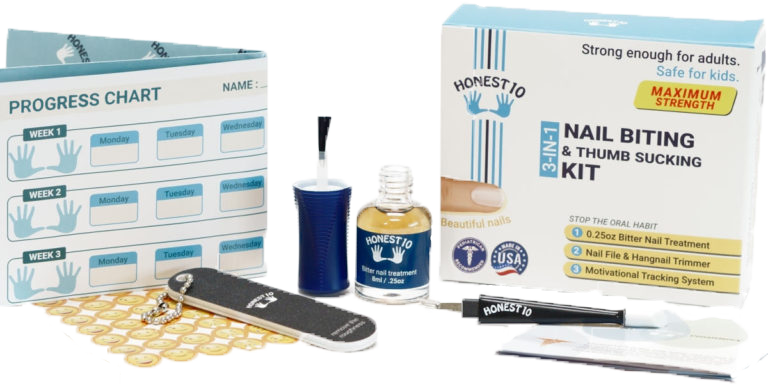
Is Biting Your Nails Bad?
You’re likely reading this because you’re wondering, “is biting your nails bad?” It’s a valid question. In truth, nail biting is a common behavior, and almost half of American adults and children have bitten their nails at some point in their lives. In most cases, nail biting is a phase that starts in childhood and passes with age and maturity.
According to a study by the American Psychological Association (APA), moderate nail biting is a common behavior associated with anxiety in children and adults. The APA goes on to state that it is relatively harmless and 65% of long-term nail biters grow out of the habit by the age of 30.
So, is biting your nails bad? The answer is, in some instances, yes. If left unchecked, ongoing and aggressive nail biting can lead to negative health complications. So if you’re worried about why biting your nails is bad, then read further to learn more about the consequences of nail biting.
Causes of Biting Your Nails
As mentioned, the most common cause for nail biting is related to anxiety. Many children and adults pick up this habit as a way to cope with stress. For example, children with separation anxiety often suck their thumbs or chew their nails as a way to counteract feelings of loss or confusion. Stress or nervousness is a big trigger for nail biting and should be taken into account when determining how to stop nail biting in children or adults.
In more intense cases, nail biting could stem from psychological issues such as attention deficit hyperactivity disorder (ADHD). According to the National Center for Biotechnology Information, over 70% of children with ADHD also bite their nails. But this behavior isn’t exclusive to children. So, if you’re asking yourself why is biting nails bad and you suffer from ADHD, you may find a link to your nail biting habit and this psychological condition.
Other psychological impairments may trigger nail biting such as major depressive disorder, and Tourette syndrome. Furthermore, obsessive-compulsive disorder (OCD) is linked to excessive nail biting too. According to the American Medical Association (AMA), many people who suffer from OCD have a tendency for over-grooming. This, in turn, may develop into excessive skin-picking and nail biting. In fact, the AMA cites that people diagnosed with OCD are 10 times more likely to bite their nails.

Pros of Biting Your Nails
In the midst of your research to explain why is biting your nails bad, you’ve likely come to the conclusion that there couldn’t possibly be any advantages to the habit. While it’s true, biting nails conjures more negatives than positives, there are still some slight benefits to nail biting.
For example, the process of chewing nails renders a sense of control in an otherwise chaotic environment. If you bite your nails when life is running amok and things get crazy, this behavior can be quite soothing and comfortable. In essence, nail biting is shown to reduce feelings of helplessness as well as soothe jagged nerves.
Furthermore, The National Library of Medicine has made a connection between low self-esteem and nail biting. They conducted a study on 100 adults and found that nail biting was more prominent with people who suffered from low confidence and poor self-image. The study went on to say that in these cases, the act of biting nails was actually calming and helped reduce anxiety. But remember, while nail biting might be a soothing activity, there are far healthier alternatives to help calm your nerves.
Cons of Biting Your Nails
The disadvantages to nail biting are many, and some of the negative consequences can be extremely damaging to your health. Here are some facts that put the question, “is biting your nails bad for you?” to rest with a resounding, “Yes, it is bad”, and potentially hazardous to your long-term health.
Spread of Germs
Consider everything you touch all day long, and then consider that all these items carry germs and bacteria. Even with regular hand washing, germs are still on your hands and fingertips from everything you’ve touched throughout the day. So when you put your fingers to your mouth for nail biting, you’re essentially spreading and ingesting harmful germs and bacteria. This could potentially lead to contracting colds, viruses, or even serious diseases. In extreme cases, nail biting may even lead to an oral sexually transmitted infection (STI). To explain, if the bacteria called E.coli is ingested, it could develop into the STI known as herpes, causing diarrhea, vomiting, and mouth sores.
Oral Problems
In addition to the bacteria under the nails potentially making you sick, it can also cause serious dental issues. Germs enter the mouth through nail biting, and could lead to gingivitis and gum disease. Furthermore, constant gnawing, chewing, and clicking of teeth from nail biting could cause tooth decay as well as cracking and chipping of teeth. While not as severe as a broken tooth, nail biting also causes foul-smelling breath.
Risk of Infection
Excessive nail biting can lead to tenderness and weakness in the fingertips which, in turn, may result in open sores and wounds. When bacteria enter these wounds, it could cause an infection. At best, an infection can be painful and uncomfortable but treated with a simple over-the-counter antibacterial ointment. At their worst, a nail biting infection could manifest into a pus-filled abscess which may require a doctor’s attention and oral antibiotics.
Unsightly and Disfiguring
If you suffer from an intense phase of nail biting, you probably know the most obvious disadvantage to this habit is that it’s just plain ugly to look at. In fact, according to WebMD, over 70% of adults claim that concerns about their appearance motivated them to quit the habit for good. The unsightliness of chewed, mangled nails is off putting and can be extremely embarrassing. What’s even worse is if the habit persists, it could cause permanent damage, thus disfiguring the nails for life.
What Can You Do To Kick the Habit?

Now that we’ve cleared up any doubts about whether or not is biting nails bad, what’s the next step? Well, given that it’s clear that nail biting is not conducive to your health; it’s time to start getting serious about kicking the habit.
The biggest mistake people make when trying to crush the nail biting habit, is hoping that there is a one-size-fits-all solution. In truth, there is no single product that is a 100% cure for nail biting. This is because nail biting is a habit, and in most cases, it is deeply linked to emotional and psychological issues. As with all habits, recovery takes a multi-faceted approach. This means to ensure your success at breaking the cycle, you must recruit many different strategies to kick the habit for good.
Doing this is made simple with Honest10. Why? Because this is a comprehensive kit that includes everything you need to stop nail biting. The anti-bite solution you apply to your nail is one of the most powerful formulas on the market. Plus, it is made in the USA, safety-tested, and pediatrician approved. What makes Honest10 even better is that it comes in an all-in-one kit that includes all the quality nail tools you need such as a trimmer and nail file. Furthermore, this helpful anti-nail biting kit has a progress chart calendar and motivational props to keep you on the right track. If you want the best head start on your path, use Honest10 to help stop nail biting once and for all.
Conclusion
Hopefully, these insights fully answer your question about why is biting your nails bad. Not only is it unsightly and embarrassing, nail biting may lead to long-term health problems. From spreading germs, causing infections, or oral complications – nail biting is a nasty habit that can wreak havoc on your life. However, with the right nail biting treatment kit, commitment and determination you can rid yourself of this habit for good.
